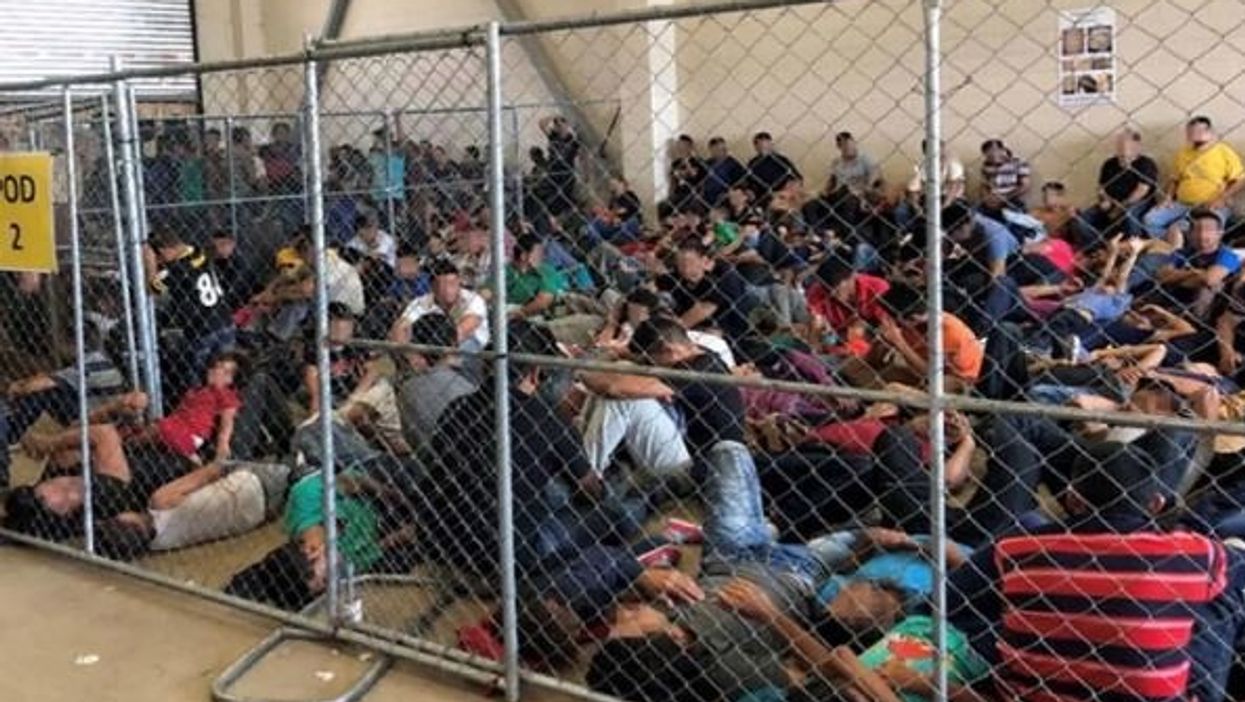
Immigration officials say they are implementing new procedures at detention centers across the country in the midst of the ongoing COVID-19 outbreak, but advocates and experts worry that more needs to be done in order to protect the health of those inside.
On Thursday, a Customs and Border Protection spokesperson said in an email that the agency was using "existing procedures" to keep detainees safe from COVID-19, the disease caused by a strain of coronavirus that originated in China, as well as other communicable diseases.
The spokesperson said the agency had issued guidance to all employees "that outlines the current comprehensive use of Personal Protective Equipment including guidance regarding wearing masks in the appropriate circumstances."
Migrants "identified with symptoms [of COVID-19] may be provided with a mask and referred to CDC or EMS personnel for additional health screening," the spokesperson said. The agency is also identifying individuals who have recently traveled in China and/or Iran within the previous 14 days for enhanced health screenings.
After those screenings, Centers for Disease Control and Prevention personnel will make the determination as to "whether any additional measures must be taken."
The spokesperson did not share any additional measures had been put in place at detention centers regarding the COVID-19 outbreak. CBP did not respond to questions about whether any detainees or Border Patrol staff at its various detention centers had been tested for COVID-19, or if any had tested positive.
Experts and advocates worry that, despite these measures, border officials — including those with Immigration and Customs Enforcement, which did not respond to a request for comment for this article — still aren't doing nearly enough to prevent and outbreak from spreading among the hundreds of thousands of immigrants currently detained in their facilities.
In light of the COVID-19 outbreak, for instance, the CDC has recommended that households routinely clean high-touch surfaces such as countertops and doorknobs, and that businesses provide disposable wipes so that employees can keep areas clean. The CDC also recommends infected individuals in a household use a separate bathroom, if possible.
Neither CBP nor ICE responded to questions about if and how they are implementing those recommendations inside their respective detention facilities, or if they have the capacity to quarantine individuals who become infected with COVID-19.
Some have noted that ICE specifically has been silent on the matter thus far and has not issued any news or press releases about the coronavirus or COVID-19 at all.
"ICE and CBP must immediately issue public statements outlining its plans to prevent the spread of the coronavirus in its jails and prisons," Rebekah Entralgo, spokesperson for Freedom for Immigrants, said in a email on Thursday. "The agencies must also reassure individuals that they can access resources and care without fear."
Entralgo noted that detained immigrants, who may face crowded conditions, are at higher risk of catching and then spreading the virus.
More than 100 people in the United States have been infected so far, and nearly a dozen have died.
"CBP needs to be doing more than just handing out masks," Rep. Judy Chu (D-CA), a staunch critic of Trump's immigration policies, said in an email this week. CBP, she added, "should think about the role it is playing in actually exacerbating this pandemic because they are putting Donald Trump's politically motivated war on immigrants above the actual needs of the country and the world."
Some experts' concerns are based on previous investigations that uncovered numerous health problems at migrant detention centers, including overcrowding and unsanitary conditions.
The Trump administration's own inspectors reported last May that detainees at an ICE detention facility near El Paso, Texas, were "wearing soiled clothing for days or weeks" and observed some detainees "standing on toilets in the cells to make room and gain breathing space, thus limiting access to the toilets."
The El Paso Del Norte Processing Center has a maximum capacity of 125 people, but inspectors reported border officials there had crammed more than 900 into the space.
Thirty-two immigrants at CBP's Central Processing Center in McAllen, Texas, were also found to be suffering from communicable diseases last year and were quarantined. The discovery was made following the death of a 16-year-old Guatemalan boy, Carlos Gregorio Hernandez Vasquez, who had been detained at the center and tested positive for influenza.
Attorneys said later that year that conditions in the McAllen facility were so dirty and overcrowded that mothers had started saving bottled water to mix baby formula because the building's water tasted "like bleach."
One lawyer told the Texas Tribune that immigrants there weren't receiving adequate medical treatment and that some of the mothers, "unable to clean themselves," had resorted to "wiping their children's runny noses or vomit with their own clothing." Cups and baby bottles were shared, because there simply weren't enough to go around.
"Basic hygiene just doesn't exist there. It's a health crisis … a manufactured health crisis," the lawyer said.
At least seven children have died in U.S. custody since 2017, several from diseases like the flu.
The Trump administration has declined to address the problem head on. In December, Border Patrol and the Department of Homeland Security came under fire after officials refused to offer flu shots to migrant detainees, even when they were offered at no charge by a group of doctors.
"Of course Border Patrol isn't going to let a random group of radical political activists show up and start injecting people with drugs," a DHS spokesperson tweeted at the time.
As the New York Times noted, the CDC had warned earlier last year that immigrants 6 months and older should be given the flu vaccine "at the earliest point of entry" to prevent the spread of such communicable diseases while in custody.
Experts worry that detention facilities like the ones maintained by CBP and ICE are particularly vulnerable to outbreaks like COVID-19 due to crowded conditions, especially as border officials are slow to act.
"Detention facilities are breeding grounds for infection," Wendy Parmet, director of the Center for Health Policy and Law at Northeastern University School of Law, said in an email this week.
Parmet recently joined 700 law, public health, and human rights experts to send a letter to the Trump administration on how to enact an effective COVID-19 response.
"Most importantly, the facilities need more medical staff, and the staff need training on how to reduce the spread of infection, and protective equipment to keep themselves and migrants safe," she explained this week.
Additionally, she said, "ICE needs to administer flu vaccines, to reduce the overall incidence of respiratory diseases."
She added that one of the best measures would be to reduce the number of people in detention centers.
Some detention facilities have become less crowded due to the Trump administration's controversial Remain in Mexico policy, which forces asylum-seekers to wait in Mexico rather than the United States ahead of their scheduled court date. The policy, however, has created health risks for the more than 55,000 immigrants in makeshift communities on the Mexican side of the southern border who are waiting to argue their cases.
In November, the Associated Press reported that people there were forced to bathe and wash their clothes in the Rio Grande, which is contaminated with E. coli and other bacteria. Doctors without Borders identified numerous health risks as a result of those conditions, including diarrhea and asthma.
"Speaking from having seen other humanitarian crises in the world, this is one of the worst situations that I've seen," Helen Perry, a nurse practitioner and operations director for medical nonprofit Global Response Management, told the AP. "It is only going to get worse, and it is going to get worse rapidly."
Earlier this week, Trump said his administration may shut down the southern border to prevent further spread of COVID-19, even though the World Health Organization reports far more confirmed cases in Canada (30) and the United States (129) than Mexico, which has reported five cases so far.
"We are thinking about the southern border," he said. "We are looking at that very strongly."
The move appeared to be another attempt by the Trump administration to implement anti-immigrant policies under the guise of national security, rather than a plan to prevent further infections.
As COVID-19 continues to spread, the administration will need to focus more substantial efforts on migrants exposed to dangerous conditions, both those forced back across the border and the many thousands still in CBP and ICE custody.
"People residing in close quarters, such as immigrant jails and prisons, are particularly vulnerable to public health crises. So too are undocumented immigrants who may go without accessing health care in this age of increased immigration enforcement," Entralgo said this week.
In a column for STAT News on Wednesday, Parmet noted that, aside from simply screening those entering detention facilities, CBP and ICE, as well as their parent agency, DHS, should work specifically to improve facility conditions and "relax" rigorous immigration policies like Remain in Mexico that could make things worse.
"The Department of Homeland Security must work to improve health care in detention facilities and relax the policies that are adding to crowding both north and south of the border," she wrote.
"During a pandemic, overcrowding and unsafe conditions not only pose a risk for migrants, but can endanger the health of everyone."
Published with permission of The American Independent Foundation.








